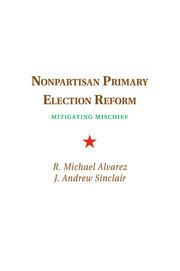Description
Nonpartisan Primary Election Reform
Mitigating Mischief
Authors: Alvarez R. Michael, Sinclair J. Andrew
Examines California's first use of the 'top-two' primary system in 2012 from a variety of perspectives, using several different methodologies.
Language: English
Subject for Nonpartisan Primary Election Reform:
Approximative price 31.58 €
In Print (Delivery period: 14 days).
Add to cart
Nonpartisan Primary Election Reform
Publication date: 11-2015
Support: Print on demand
Publication date: 11-2015
Support: Print on demand
Approximative price 73.89 €
In Print (Delivery period: 14 days).
Add to cart
Nonpartisan Primary Election Reform
Publication date: 04-2015
Support: Print on demand
Publication date: 04-2015
Support: Print on demand
Description
/li>Contents
/li>Biography
/li>
Over the years, observers of American politics have noted the deleterious effects of party polarization in both the national and state legislatures. Reformers have tried to address this problem by changing primary election laws. A theory underlies these legal changes: the reformers tend to believe that 'more open' primary laws will produce more centrist, moderate, or pragmatic candidates. The 'top-two' primary, just implemented in California, represents the future of these antiparty efforts. Nonpartisan Primary Election Reform examines California's first use of the top-two primary system in 2012. R. Michael Alvarez and J. Andrew Sinclair evaluate the primary from a variety of perspectives and using several different methodologies. Although the first use of this primary system in California did not immediately reshape the state's politics, it also did not have many of the deleterious consequences that some observers had feared. This study provides the foundation for future studies of state primary systems.
1. A problem posed in Tampa; 2. Primary expectations; 3. The year and the proposition; 4. What happened in 2012?: legislative elections; 5. Primary elections and voter participation; 6. The voter's view; 7. Abandonment of weak parties; 8. Voter expectations for California's top-two primary; 9. Voting rights, representation, and the top-two primary; 10. Beyond the spatial model; 11. Conclusion.
R. Michael Alvarez is a world-renowned expert in the study of electoral behavior and election administration, as well as political methodology and survey research. In addition to publishing scores of articles in academic journals, he recently published Evaluating Elections: A Handbook of Methods and Standards (Cambridge, 2012). A Fellow of the Society for Political Methodology, he currently co-edits the Society's journal, Political Analysis.
J. Andrew Sinclair completed his PhD at the California Institute of Technology in 2013 and wrote his dissertation on American primary elections. His academic research focuses on voter behavior, political institutions, and democratic accountability.
J. Andrew Sinclair completed his PhD at the California Institute of Technology in 2013 and wrote his dissertation on American primary elections. His academic research focuses on voter behavior, political institutions, and democratic accountability.
© 2024 LAVOISIER S.A.S.




